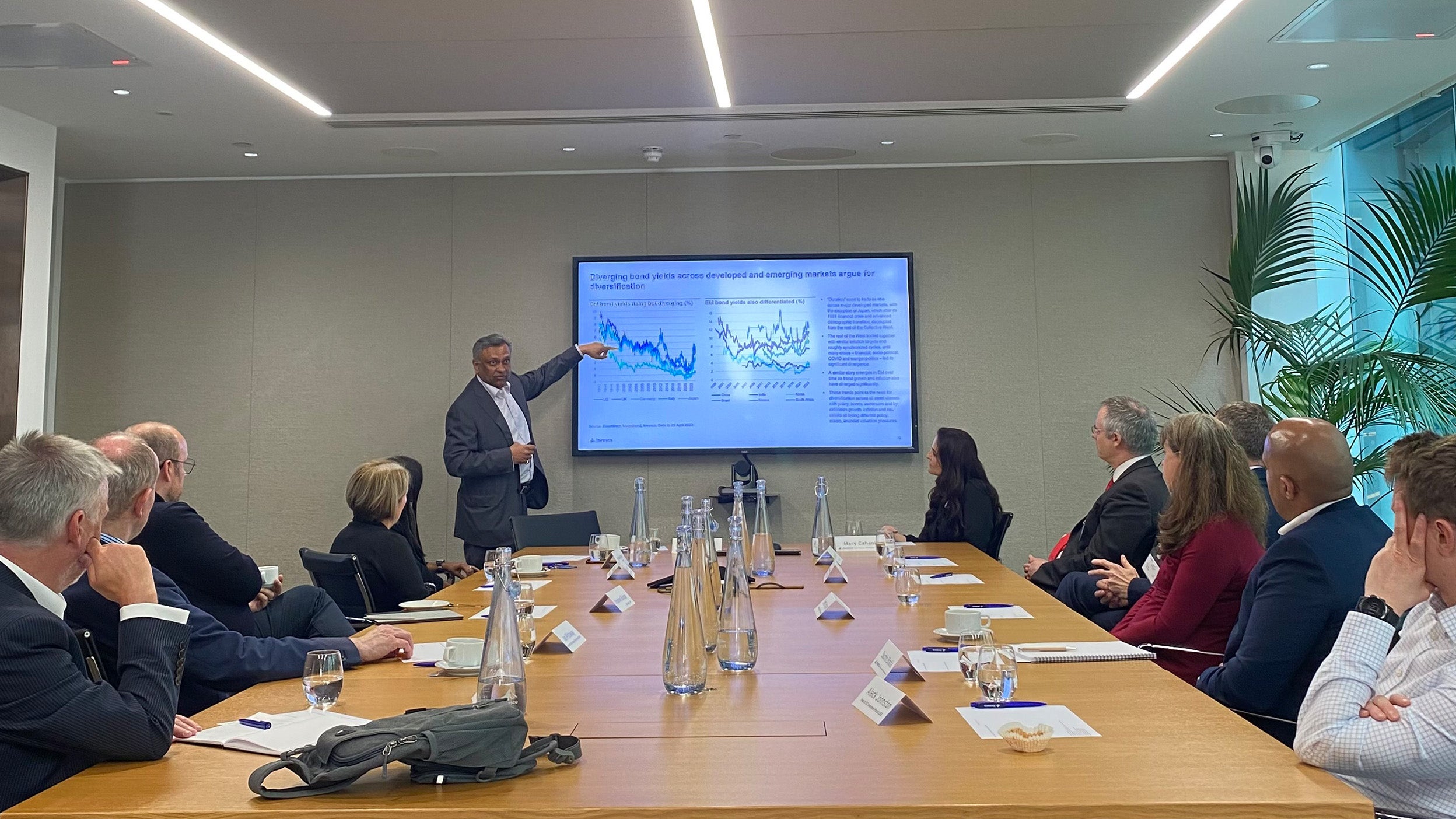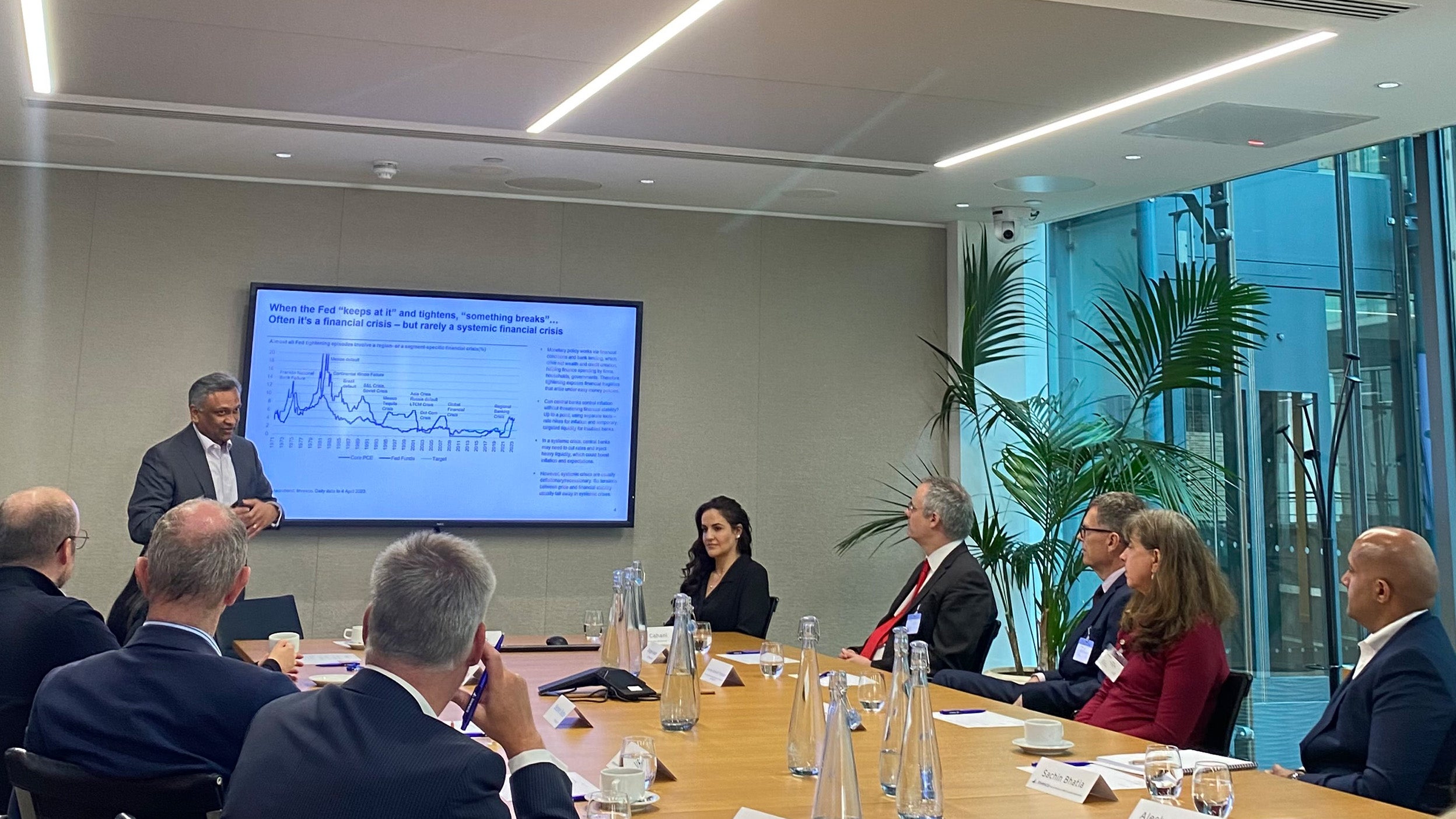
ETF The strategic advantage of AAA-rated CLO Notes
Invesco Private Credit’s Kevin Petrovcik discusses new developments for AAA-rated Collateralised Loan Obligation (CLO) note investments and their potential advantages.

Diversification in DC pensions, UK government pushing to improve long-term outcomes by diversifying into illiquids
Value over price, need to educate stakeholders about improved outcomes as they grapple with higher costs of illiquid investing
Illiquids can offer a way of implementing ESG strategy quicker by investing is more sustainable infrastructure projects and early-stage new technologies
“Why would you put illiquids into a UK Defined Contributed (DC) pension portfolio?” asks Andrew Warwick-Thompson, Professional Trustee at Capital Cranfield. The reason, he believes, is for diversification in portfolios.
“Trustees need to consider the benefits for their members of diversifying into illiquids,” Warwick-Thompson continued. “If they're predominantly invested in passive funds, and most DC schemes are, you want some alpha to beat the market. So, how are you going to do that? You will get some from asset allocation, but you’ll probably also get some excess returns from illiquids.”
It was at the recent Invesco Pension Roundtable (chaired by Mary Cahani, Director of UK Institutional at Invesco), that Warwick-Thompson shared this view. Together with other DC pension experts, they discussed:

Currently, UK DC schemes hold over £500bn of assets and are under-invested in illiquid investments compared to other countries like Canada and Australia.
The UK government has been pushing for the diversification of DC pension schemes into illiquids to improve long-term outcomes for pension holders. The UK government has proposed new rules to broaden the investment opportunities to invest into illiquid investments such as infrastructure and private equity. A new structure called Long Term Asset Funds (LTAF), has been launched to make it easier to invest in such assets.
Archanna Ramu, Senior Legal Counsel at Invesco said there were two UK policy themes emerging for DC pensions to improve outcomes.
Firstly, the UK government has called for the consolidation of smaller DC schemes into Master Trusts (or DC schemes that can be used by multiple unrelated employers), which have the scale and expertise to manage a wider range of assets, including illiquid assets.
The second, was an ambition for UK pensions to integrate ESG (environmental, social and governance) into investments, which the Pensions Regulator thinks many schemes are being slow to do.
However, the move to diversify into illiquids has raised lots of questions for the industry. Participants at the roundtable suggested that the industry is still grappling with the higher cost of investing in illiquids. There was a need to educate the industry about outcomes.
Stephen Budge, DC partner at LCP, is a member of the Productive Finance Working Group set up to develop practical solutions to the barriers to investing in long-term, less liquid assets.
“As part of the developing practical solutions, all the key DC consultancies were asked to sign up to prioritising value over price when it came to considering DC investment strategy design. There was a statement made by the consultants to say cheaper is not always best,” said Budge.
This was a view supported by Sachin Bhatia, Head of UK Pensions and EMEA Consultant Relations at Invesco, who works with UK investment consultants.
The reality is there’s still a lot of decision making driven by price. “I don’t see that changing in the near term,” said George Fowler, DC Partner at ISIO.
George Fowler, DC Partner at ISIOI think there's this tension between price and delivering the best net of fees outcome. We all know that if we bring in illiquids it will lead to a better outcome if done well, versus the commercial reality of running a Master Trust and how selections are made.
“I think we will only genuinely see moves into illiquids once there’s more industry consolidation. Investing in illiquids is a challenge, but I don’t think it’s an insurmountable challenge. You need scale and the resources to do it well, Master Trusts and I think LTAFs will make it easier.”
Alison Bostock, Independent Trustee at Zedra, agreed while price might be currently king, she thought as the market matures it it’ll be easier. “You can see this is all working well in the future,” she said. “We’ll be able to show members: here is what you could have won if you had chosen these types of assets and this is how the projections look going forward. I’m optimistic it will get there.”
Not all the DC market participants are driven by price, highlighted Roger Breeden, Independent Trustee at BESTrustees, “If you take other areas of the DC market where small firms are buying without advice, they’re buying on convenience and member experience rather than price.”
The UK government reform plans also include an exemption of performance fees, a common component in private market investing, from the annual 0.75% price cap on annual charges in DC default funds. But the roundtable experts were split about whether they are fair.
Emma Douglas, Managing Director of Workplace at Aviva said: “A performance fee is great, but how does it work without some level of unfairness? We probably need guidance around how that can happen. I've seen in the past where a fund’s performance fees have been accrued for on a daily basis.”
She concluded that if the issue of fairness can be solved, especially when investors go in and out of funds daily, DC members would be much more open to the idea of performance fees.
The Productive Finance Working Group in their ‘Roadmap for Increasing Productive Finance Investment’ outlined there’s “widespread agreement on the need for innovative industry solutions for reconciling investment in less liquid assets with performance fees.”
Some of their suggestions for DC schemes included linking performance fees to realised profits, accrual methodologies for performance fees, and principles for typical hurdle rates for performance fees across different asset classes.
Diversification of assets is also key when investing in illiquids, participants agreed. They thought they should be allowed to invest in assets wider than the UK market, although the government has mooted forcing schemes to invest a proportion of their assets only in UK companies to help stimulate the economy.
Arnab Das, Global Macro Strategist at Invesco talked about the fact that world economies are going through structural shocks and trends.
In recent history, this started with the Global Financial Crisis. Then there was the Eurozone Crisis. More recently, in Europe there’s been a domestic socio-political crisis (Brexit, rise of populism/nationalism) and geopolitical crisis (US-China tensions; Russia’s war). The global natural environmental crises (COVID, climate change) as well as technological disruption and demographic change. Now, the banking crisis has reignited.
These are clear examples of the need to and importance of diversifying asset classes.
Illiquids also give investors a lot more investment opportunities. “More than 50% of investment opportunities in the world that are not listed,” said Warwick-Thompson. “So, if you say I’m not going to invest in illiquids, you’re only investing in a fraction of the market available to you and how is that likely to be good for your members?”
It’s also another way of giving DC pensions environmental, social and governance (ESG) access. However, the participants pointed out ESG could be difficult to measure in illiquids, but if it was integrated it could be a better way to access ESG.
Aleck Johnston, Head of DC Investment Product at USS, explained that by investing in illiquid assets it’s also an opportunity to go on an ESG transition journey with them. “The companies we are owning aren’t necessarily Paris aligned or have done the heavy lifting,” said Johnston. “Part of owning a private company is doing that work with the company. There’s quite an alignment piece with decarbonising the portfolio.”
Others concurred that investing in early-stage companies was a chance to improve ESG credentials.
When it comes to the final outcome for pensions, decumulation was very important for pension holders. The Nobel Prize winning economist William F. Sharpe called this one of the “nastiest, hardest problem in finance.”
“We’re going to have people with big pots but who are not well equipped to take those financial decisions,” said Ian Pittaway, Independent chair at Aegon (Ross Trustees, IGG).
For a good member outcome, there’ll be multiple decisions made over time. For example, the decision whether to draw down income or buy an annuity will likely need to be revisited over time. “I think the mistake we’re making now is to think there’s just one decision” said Warwick-Thompson. “Putting a support structure around that is absolutely critical and that’s more important in my view in what you do with the underlying investments.”

Income funds will become very important to reduce the risk to members from selling units at an inopportune time. Amortizing funds would reduce this risk further but the need to choose a maturity date for this income years in advance can be problematic.
A new model will need to evolve if support to make decisions is to be extended to a wider group of DC savers – Master Trusts may need to provide services traditionally offered by IFAs but to a wider audience, which could be challenging within the fee cap.
Diversification into illiquids, the value over price debate, and decumulation are some of the issues currently impacting UK DC pension schemes. The direction of travel remains to be seen, but there are clearly benefits to be had, whether that’s diversification, access to ESG or improved outcomes for investors.
To find out how we can help you, visit our real estate, senior loans, alternatives, IQS strategies, ESG opportunities and DC solutions insight pages.

Invesco Private Credit’s Kevin Petrovcik discusses new developments for AAA-rated Collateralised Loan Obligation (CLO) note investments and their potential advantages.

Is the current short-term noise and volatility an early indicator of a cyclical movement or a structural shift in commercial real estate investing?

Invesco Real Estate’s value-add team discusses its approach in a challenging market highlighting a disciplined, local team-based execution programme and strategic investments in sectors like logistics and living.
Invesco Investment Solutions develops CMAs that provide long-term estimates for the behavior of major asset classes globally. The team is dedicated to designing outcome-oriented, multi-asset portfolios that meet the specific goals of investors. The assumptions, which are based on a 10-year investment time horizon, are intended to guide these strategic asset class allocations. We also utilize 5-year CMAs to give a half-cycle view. For each selected asset class, we develop assumptions for estimated return, estimated standard deviation of return (volatility), and estimated correlation with other asset classes.
Fixed income returns are composed of; the average of the starting (initial) yield and the expected yield for bonds, estimated changes in valuation given changes in the Treasury yield curve, roll return which reflects the impact on the price of bonds that are held over time, and a credit adjustment which estimates the potential impact on returns from credit rating downgrades and defaults. Equity returns are composed of; a dividend yield, calculated using dividend per share divided by price per share, buyback yield, calculated as the percentage change in shares outstanding resulting from companies buying back or issuing shares, valuation change, the expected change in value given the current Price/Earnings (P/E) ratio and the assumption of reversion to the long-term average P/E ratio, and the estimated growth of earnings based on the long-term average real GDP per capita and inflation. Volatility estimates for the different asset classes, we use rolling historical quarterly returns of various market benchmarks. Given that benchmarks have differing histories within and across asset classes, we normalize the volatility estimates of shorter-lived benchmarks to ensure that all series are measured over similar time periods.
For additional details regarding the methodology used to develop these estimates, please see our white paper Capital Market Assumptions: A building block methodology.
This information is not intended as a recommendation to invest in a specific asset class or strategy, or as a promise of future performance. These asset class assumptions are passive, and do not consider the impact of active management. Given the complex risk-reward trade-offs involved, we encourage you to consider your judgment and quantitative approaches in setting strategic allocations to asset classes and strategies. This material is not intended to provide and should not be relied on for tax advice.
References to future returns are not promises or estimates of actual returns a client portfolio may achieve. Assumptions and estimates are provided for illustrative purposes only. They should not be relied upon as recommendations to buy or sell securities. Forecasts of financial market trends that are based on current market conditions constitute our judgment and are subject to change without notice. Estimated returns can be conditional on economic scenarios. In the event a particular scenario comes to pass, actual returns could be significantly higher or lower than these estimates.
Indices are unmanaged and used for illustrative purposes only. They are not intended to be indicative of the performance of any strategy. It is not possible to invest directly in an index.
The CMAs included are based on Invesco’s return expectations for the asset classes shown. The indices referenced are included as proxies for the asset classes and have been selected because they are well known and are easily recognisable by investors. The inclusion of these indices is not linked to the promotion of any investment products or services.
The value of investments and any income will fluctuate (this may partly be the result of exchange rate fluctuations) and investors may not get back the full amount invested.
Property and land can be difficult to sell, so investors may not be able to sell such investments when they want to. The value of property is generally a matter of an independent valuer’s opinion and may not be realised.
The strategies are particularly dependent on the analytical abilities of their investment managers on senior loans. Many senior loans are illiquid, meaning that the investors may not be able to sell them quickly at a fair price and/or that the redemptions may be delayed due to illiquidity of the senior loans. The market for illiquid securities is more volatile than the market for liquid securities. The market for senior loans could be disrupted in the event of an economic downturn or a substantial increase or decrease in interest rates. Senior loans, like most other debt obligations, are subject to the risk of default. The market for senior loans remains less developed in Europe than in the U.S. Accordingly, and despite the development of this market in Europe, the European Senior Loans secondary market is usually not considered as liquid as in the U.S.
The ESG strategies intend to invest in securities of issuers that manage their Environmental, Social and Governance (ESG) exposures better relative to their peers. This may affect exposure to certain issuers and cause the strategies to forego certain investment opportunities. The strategies may perform differently to others, including underperforming other strategies that do not seek to invest in securities of issuers based on their ESG ratings.
Views and opinions are based on current market conditions and are subject to change
This is marketing material and not intended as a recommendation to buy or sell any particular asset class, security or strategy. Regulatory requirements that require impartiality of investment/investment strategy recommendations are therefore not applicable nor are any prohibitions to trade before publication.